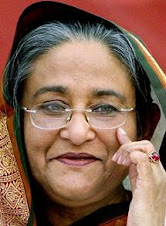
Happy new Year 2009. New year new Goverment New Governance culture.
Sheak Hasina expressed her positive reformed(not like before political culture-enemy atitude to the poosition)attitude,After one day of the election and in the 1st meet with the media she cleared the next vision of her governance,
On Wednesday (31-12-2008) she offered the promise of power-sharing to her defeated rival in a bid to persuade her to accept the results of the poll.
This time, Sheikh Hasina has struck a conciliatory note, saying she wants to establish a new political culture in the country. She said "we no longer want the politics of violence and
clashes."
”As winners, we have to deal with everything with a sense of forgiveness and accommodation instead of vengeance, to take the country forward in cooperation with all, irrespective of party affiliation,”
Professor of Political Science at Dhaka University, Ataur Rahman, says Sheikh Hasina has made the right gesture. He says it is now up to Khaleda Zia to reciprocate, and build a genuine
democratic culture in the country.
"She should reciprocate positively. Otherwise the country will slowly or gradually lose the political stability and also the essence of democracy which is compromise and understanding
and working together," said Rahman. "We don't want to foresee such a future for Bangladesh."
In a statement, international observers also urged the opposition to accept the election result, and called on the two leaders to work together to tackle the country's problems.
Sheikh Hasina and Khaleda Zia dominate Bangladeshi politics and have alternated in power for the last 15 years. But whoever has been in opposition, has played an obstructive role - leading strikes, violent street protests, and boycotting parliament. The 2007 elections were cancelled because their two parties could not agree on how the polls should be held.
This time, both leaders are under pressure to give democracy a chance after two years of emergency rule, during which both spent months in prison on charges of corruption.
About Sheikh Hasina
Sheikh Hasina, 61, first came to power in 1996, ruling for five years before being ousted at the polls by Mrs Zia. Sheikh Hasina is the daughter of Bangladesh’s late president, Sheikh Mujibur Rahman, who was assassinated in a 1975 military coup, only four years after Bangladesh’s independence from Pakistan.


